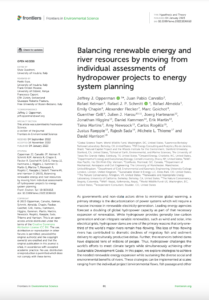Full Title: Balancing Renewable Energy and River resources by Moving from Individual Assessments of Hydropower Projects to Energy System Planning
Author(s): Jeffrey J. Opperman, Juan Pablo Carvallo, Rafael Kelman, Rafael Schmitt, Rafael Almeida, Emily Chapin, Alexander Flecker, Marc Goichot, Guenther Grill, Julien Harou, Joerg Hartmann, Jonathan Higgins, Daniel Kammen, Erik Martin, Taina Martins, Amy Newsock, Carlos Rogéliz, Justus Raepple, Rajesh Sada, Michele Thieme, and David Harrison
Publisher(s): Frontiers in Environmental Science
Publication Date: January 4, 2023
Full Text: Download Resource
Description (excerpt):
As governments and non-state actors strive to minimize global warming, a primary strategy is the decarbonization of power systems which will require a massive increase in renewable electricity generation. Leading energy agencies forecast a doubling of global hydropower capacity as part of that necessary expansion of renewables. While hydropower provides generally low-carbon generation and can integrate variable renewables, such as wind and solar, into electrical grids, hydropower dams are one of the primary reasons that only one-third of the world’s major rivers remain free-flowing. This loss of free-flowing rivers has contributed to dramatic declines of migratory fish and sediment delivery to agriculturally productive deltas. Further, the reservoirs behind dams have displaced tens of millions of people. Thus, hydropower challenges the world’s efforts to meet climate targets while simultaneously achieving other Sustainable Development Goals.
In this paper, we explore strategies to achieve the needed renewable energy expansion while sustaining the diverse social and environmental benefits of rivers. These strategies can be implemented at scales ranging from the individual project (environmental flows, fish passage and other site-level mitigation) to hydropower cascades to river basins and regional electrical power systems. While we review evidence that project-level management and mitigation can reduce environmental and social costs, we posit that the most effective scale for finding balanced solutions occurs at the scale of power systems.
